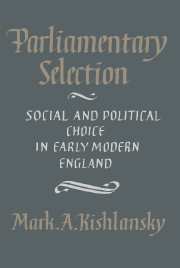4 - Addled Selections
from PART I - SELECTIONS AND SOCIAL CHOICE
Published online by Cambridge University Press: 22 September 2009
Summary
Contested elections were the failures. Before 1640 elections were held infrequently and randomly. They represented a breakdown in the process of sorting and sifting, and then the failure of mediation. In contested elections the characteristic restraints of unified choices – deference toward social superiors, reciprocity with kin and neighbors, obedience to magistrates – were all removed. Because they bypassed the safeguards designed to prevent them, contests were bitterly fought – on occasion literally fought. They called forth the primal instincts of individuals cut adrift from their communities. If selections were designed to affirm the will of local society, elections asserted the power of the individual against it. Contests were inherently divisive, creating tests of elemental allegiance that necessarily rent the larger networks by which communities were held together. They were truly addled – beginning in muddles over intentions and obligations and ending in all manner of antisocial behavior.
The nature of electoral contests has led to some confusion about their frequency and importance in the Elizabethan and early Stuart periods. Because they aroused deep feelings, elections left their mark upon the locality in ways that more prosaic forms of selection did not. Being unusual, they were worthy of comment. News of them comes to us from London gossips and from court savants. Their details can be found in the archives of local leaders and of national figures who were instrumental in attempting mediation before the contest or effecting reconciliation after it. The papers of participants survive in unexpected profusion. Candidates, victors and vanquished alike, frequently felt compelled to explain and justify their conduct to each other and to leaders within their communities.
- Type
- Chapter
- Information
- Parliamentary SelectionSocial and Political Choice in Early Modern England, pp. 73 - 102Publisher: Cambridge University PressPrint publication year: 1986



